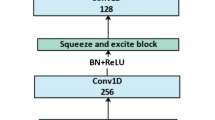Abstract
Recent work has shown the efficiency of deep learning models such as Fully Convolutional Networks (FCN) or Recurrent Neural Networks (RNN) to deal with Time Series Regression (TSR) problems. These models sometimes need a lot of data to be able to generalize, yet the time series are sometimes not long enough to be able to learn patterns. Therefore, it is important to make use of information across time series to improve learning. In this paper, we will explore the idea of using meta-learning for quickly adapting model parameters to new short-history time series by modifying the original idea of Model Agnostic Meta-Learning (MAML) [3]. Moreover, based on prior work on multimodal MAML [22], we propose a method for conditioning parameters of the model through an auxiliary network that encodes global information of the time series to extract meta-features. Finally, we apply the data to time series of different domains, such as pollution measurements, heart-rate sensors, and electrical battery data. We show empirically that our proposed meta-learning method learns TSR with few data fast and outperforms the baselines in 9 of 12 experiments.
S. P. Arango and F. Heinrich—Equal contribution.
Access this chapter
Tax calculation will be finalised at checkout
Purchases are for personal use only
Similar content being viewed by others
Notes
- 1.
- 2.
- 3.
- 4.
We provide the created meta-windows for the splits of POLLUTION and HR as pickled numpy objects in https://www.dropbox.com/sh/yds6v1uok3bjydn/AAC5GRWw0F3clopRlk00Smvza?dl=0.
References
Chung, J., Kastner, K., Dinh, L., Goel, K., Courville, A.C., Bengio, Y.: A recurrent latent variable model for sequential data. In: Advances in Neural Information Processing Systems, pp. 2980–2988 (2015)
Fabius, O., van Amersfoort, J.R.: Variational recurrent auto-encoders. arXiv preprint arXiv:1412.6581 (2014)
Finn, C., Abbeel, P., Levine, S.: Model-agnostic meta-learning for fast adaptation of deep networks. arXiv preprint arXiv:1703.03400 (2017)
Ganin, Y., et al.: Domain-adversarial training of neural networks. J. Mach. Learn. Res. 17(1), 2030–2096 (2016)
Hochreiter, S., Schmidhuber, J.: Long short-term memory. Neural Comput. 9(8), 1735–1780 (1997)
Iwata, T., Kumagai, A.: Few-shot learning for time-series forecasting. arXiv preprint arXiv:2009.14379 (2020)
Jiang, X., et al.: Attentive task-agnostic meta-learning for few-shot text classification (2019)
Lemke, C., Gabrys, B.: Meta-learning for time series forecasting and forecast combination. Neurocomputing 73(10–12), 2006–2016 (2010)
Narwariya, J., Malhotra, P., Vig, L., Shroff, G., Vishnu, T.: Meta-learning for few-shot time series classification. In: Proceedings of the 7th ACM IKDD CoDS and 25th COMAD, pp. 28–36 (2020)
Nichol, A., Schulman, J.: Reptile: a scalable metalearning algorithm, vol. 2, no. 3, p. 4 . arXiv preprint arXiv:1803.02999 (2018)
Oreshkin, B.N., Carpov, D., Chapados, N., Bengio, Y.: Meta-learning framework with applications to zero-shot time-series forecasting. arXiv preprint arXiv:2002.02887 (2020)
Oreshkin, B.N., Carpov, D., Chapados, N., Bengio, Y.: N-BEATS: neural basis expansion analysis for interpretable time series forecasting. In: International Conference on Learning Representations (2020)
Oreshkin, B.N., López, P.R., Lacoste, A.: TADAM: task dependent adaptive metric for improved few-shot learning. In: NeurIPS, pp. 719–729 (2018)
Perez, E., Strub, F., de Vries, H., Dumoulin, V., Courville, A.C.: Film: visual reasoning with a general conditioning layer. In: AAAI, pp. 3942–3951 (2018)
Purushotham, S., Carvalho, W., Nilanon, T., Liu, Y.: Variational recurrent adversarial deep domain adaptation. In: ICLR (2017)
Rajendran, J., Irpan, A., Jang, E.: Meta-learning requires meta-augmentation. In: Advances in Neural Information Processing Systems, vol. 33 (2020)
Ravi, S., Larochelle, H.: Optimization as a model for few-shot learning. In: International Conference on Learning Representations (ICLR) (2017)
Santoro, A., Bartunov, S., Botvinick, M., Wierstra, D., Lillicrap, T.: Meta-learning with memory-augmented neural networks. In: International Conference on Machine Learning, pp. 1842–1850 (2016)
Snell, J., Swersky, K., Zemel, R.: Prototypical networks for few-shot learning. In: Advances in Neural Information Processing Systems, pp. 4077–4087 (2017)
Talagala, T.S., Hyndman, R.J., Athanasopoulos, G., et al.: Meta-learning how to forecast time series. Monash Econometrics Bus. Stat. Working Pap. 6, 18 (2018)
Tan, C.W., Bergmeir, C., Petitjean, F., Webb, G.I.: Time series extrinsic regression. arXiv preprint arXiv:2006.12672 (2020)
Vuorio, R., Sun, S.H., Hu, H., Lim, J.J.: Multimodal model-agnostic meta-learning via task-aware modulation. In: Advances in Neural Information Processing Systems, pp. 1–12 (2019)
Acknowledgements
The research of Kiran Madhusudhanan is co-funded by the industry project “IIP-Ecosphere: Next Level Ecosphere for Intelligent Industrial Production”. Sebastian Pineda Arango would also like to thank Volkswagen AG who funded his internship in order to carry out this research.
Author information
Authors and Affiliations
Corresponding author
Editor information
Editors and Affiliations
1 Electronic supplementary material
Below is the link to the electronic supplementary material.
Rights and permissions
Copyright information
© 2021 Springer Nature Switzerland AG
About this paper
Cite this paper
Arango, S.P., Heinrich, F., Madhusudhanan, K., Schmidt-Thieme, L. (2021). Multimodal Meta-Learning for Time Series Regression. In: Lemaire, V., Malinowski, S., Bagnall, A., Guyet, T., Tavenard, R., Ifrim, G. (eds) Advanced Analytics and Learning on Temporal Data. AALTD 2021. Lecture Notes in Computer Science(), vol 13114. Springer, Cham. https://doi.org/10.1007/978-3-030-91445-5_8
Download citation
DOI: https://doi.org/10.1007/978-3-030-91445-5_8
Published:
Publisher Name: Springer, Cham
Print ISBN: 978-3-030-91444-8
Online ISBN: 978-3-030-91445-5
eBook Packages: Computer ScienceComputer Science (R0)





